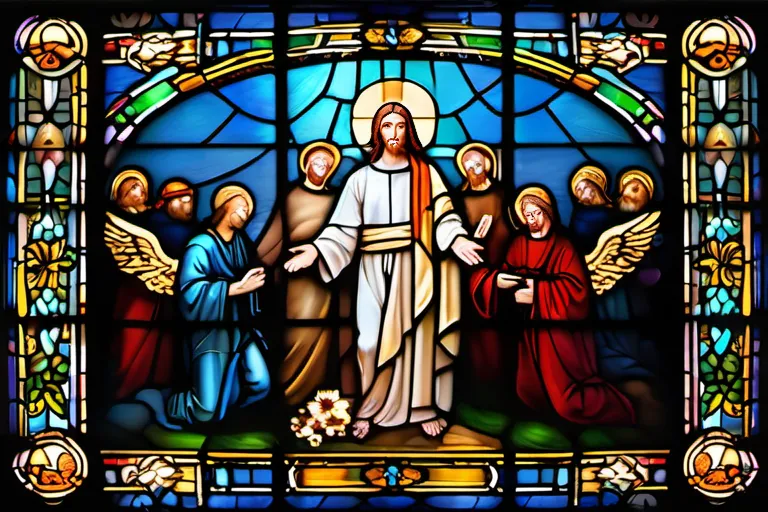Explore the beliefs, doctrines, and scriptural references that shape the Christian view of the afterlife.
The concept of the afterlife is a central aspect of many religions, and Christianity is no exception. In this article, we delve into the beliefs and doctrines surrounding the afterlife in Christianity, drawing from the Bible and other authoritative sources to provide a comprehensive understanding of this important topic.
The Biblical Basis for the Afterlife
Let’s dive into the Old and New Testaments to uncover the biblical basis for the afterlife in Christianity. These sacred texts offer profound insights, weaving together threads that paint a vivid picture of what comes next.
In the Old Testament, the idea of an afterlife is often depicted through metaphors and hints rather than explicit descriptions. For instance, consider the story of Daniel’s vision in chapter 12. Here, Daniel sees a vision where those who ‘sleep’ in the earth wake up to live forever. This passage introduces the concept of a continuation of life beyond death, hinting at the eternal state that awaits believers.
The New Testament takes this idea further with more explicit teachings. Take the book of Ephesians 2:4-6, where it states, ‘But God, being rich in mercy, because of the great love with which he loved us, even when we were dead in our transgressions, made us alive together with Christ.’ This verse encapsulates the Christian belief that through faith in Jesus Christ, believers can be spiritually resurrected.
Another compelling passage is found in Revelation 20:4-6. Here, it speaks of a time when ‘death and Hades gave up the dead they held. And death and Hades were thrown into the lake of fire.’ This vivid imagery portrays an afterlife where the dead are ultimately judged and their eternal fate is sealed.
By exploring these passages, we see that Christianity paints a picture of an afterlife characterized by resurrection, judgment, and eternal existence. These beliefs shape not only what happens to believers but also how they live in this world.
Heaven: The Destination of the Righteous
Imagine heaven as a grand banquet hall, where the righteous gather to feast on the rich fare of God’s love and grace. In Christian beliefs, this heavenly realm is not just a place but a state of eternal joy and fellowship with God. But what does it take to secure a seat at this divine table?
According to scriptures, heaven is reserved for those who have faithfully walked the path marked by righteous living, love, and obedience. The Bible speaks of these qualities through vivid metaphors: ‘The righteous shall shine like the sun in the kingdom of their Father’ (Matthew 13:43). Just as a jewel shines only when set against darkness, so too does righteousness stand out in this eternal light.
So, what are these essential virtues? The Bible emphasizes loving God and others. Jesus teaches that the entire law and prophets hang on these two commandments: love for God with all your heart, soul, and mind, and love for your neighbor as yourself (Mark 12:30-31). This is not just about sentiment; it’s a call to action—acts of kindness, justice, and compassion.
Another critical aspect is repentance. The Bible portrays repentance as turning from sin toward God. It’s like a ship changing its course after realizing the wrong direction (Acts 26:18). True repentance involves acknowledging past sins, seeking forgiveness, and making a new commitment to live righteously.
These requirements might seem daunting, but remember, God’s grace is at work. The Apostle Paul writes in Philippians 3:9 that those who are in Christ have the righteousness of God, not through their own efforts but through faith in Jesus Christ. This means heaven is a gift, earned by Christ’s sacrifice on the cross rather than human merit.
So, as you contemplate the promise of heaven, ponder this question: Are you walking the path to eternal joy and fellowship with God? Or are there still areas in your life where you need to turn back to Him in repentance and seek His grace?
Hell: The Punishment for Sin
Imagine walking down a narrow path, one that branches out into two directions—the road to righteousness and the way to hell. In Christianity, this hell is more than just a metaphor; it’s a place where sinners are thought to be punished eternally for their wrongdoing. But why does such a concept exist? What purpose does hell serve in the grand design of Christian belief?
The doctrine of hell isn’t merely about retribution; it serves as a deterrent, a stark reminder that sin carries consequences beyond our earthly existence. It’s like placing a mirror before a person to see the full impact of their choices. How can we understand this concept without delving into its scriptural roots?
According to Matt 25:46, Jesus states, ‘And these will go away into eternal punishment, but the righteous into eternal life.’ This verse emphasizes the permanent nature of the judgment for sinners. But what exactly does this eternal punishment entail? Is it a literal fire, as some might imagine, or something more symbolic?
Christian teachings often describe hell as a place of intense suffering, where souls are tormented and separated from God’s presence. However, many wonder if this separation is due to divine retribution or a natural consequence of choosing a life devoid of faith. Could it be that the absence of God in hell is a result of human free will rather than an act of divine wrath?
Theologians have debated whether hell is a physical place or a state of being, and many scriptures support both interpretations. For instance, Rev 20:14 speaks of the ‘lake of fire,’ while passages like Matt 5:22 suggest that anger can lead to eternal punishment. These diverse portrayals challenge us to think deeply about what exactly constitutes hell and its ultimate purpose.
Understanding hell is crucial for grasping the full spectrum of Christian beliefs, as it complements the idea of heaven for the righteous. It’s a reminder that our choices on earth have lasting implications in the afterlife. As we explore this complex concept, let us not forget to approach it with compassion and an open heart, recognizing that every soul is capable of change and redemption.
Purgatory: A Place of Purification
Imagine walking through a dense forest, where each step brings you closer to the light. In many ways, this journey mirrors the Christian belief in purgatory, a place of purification before entering eternal bliss with God. But what exactly is this purgatory? And why do some Christians believe it plays such an important role in the afterlife?
In Catholic theology, purgatory is seen as a place of cleansing and purification, where souls go to be made perfect before they can enter heaven. It’s like a spiritual gym where the faithful undergo a final refining process. This idea comes from the belief that while God’s love is infinite, no sinner can enter paradise with any attachment to sin. So what exactly happens here?
Think of purgatory as a wave of purification, washing away the last remnants of earthly taints and imperfections. Just like how a river might smooth stones over time, purgatory gradually refines the soul until it is pure enough for heaven’s light to shine through. This process doesn’t come without pain or discomfort; souls in purgatory experience a temporal punishment that corresponds to their sins, ensuring a just reparation.
Some may wonder why this purification isn’t completed during life on Earth. The answer lies in the belief that earthly life is filled with distractions and imperfections, making it difficult for all to live sinlessly. Therefore, purgatory serves as a final check before eternal glory, ensuring that every soul is fully prepared.
But how do souls reach this place of purification? In Catholic teachings, prayers from the living on behalf of the dead play an important role. It’s like sending a beacon to light their path through these final stages. The faithful can intercede for those in purgatory, offering them support and comfort until they cross the threshold into eternal peace.
So, while the concept of purgatory might seem daunting at first, it serves as a reminder that God’s love is patient and understanding. It provides a second chance for souls to be perfected before entering the ultimate realm of happiness and light. In this journey, every step, whether through pain or purification, brings us closer to our final destination.
The Resurrection of the Dead
Imagine for a moment, diving into the Christian perspective on the resurrection of the dead. Is this event merely a symbolic concept, or does it hold profound and tangible significance? In Christianity, the belief in the resurrection is not just a comforting thought; it’s a central tenet that shapes the very essence of faith.
The New Testament, particularly the Gospel of John and Pauline epistles, offers numerous references to this doctrine. For instance, consider Jesus’ encounter with Thomas: ‘Because you have seen me, you have believed; blessed are those who have not seen and yet have believed’ (John 20:29). This passage hints at the belief that faith in Christ is transformative and enduring, even beyond physical sight.
But what exactly does the resurrection entail? Is it merely a spiritual awakening or an actual bodily revival? The early church fathers often debated this question. Some argued for a purely spiritual resurrection, suggesting that the body would be left behind like old clothing. Others, such as St. Paul, emphasized the transformation of the physical body, stating, ‘It is sown in dishonor; it is raised in glory. It is sown in weakness; it is raised in power’ (1 Corinthians 15:43).
The timing of this event is another intriguing aspect. Will it happen at Christ’s second coming or after a period of judgment? The Book of Revelation provides tantalizing hints, but the exact sequence remains open to interpretation. Some Christians believe that the resurrection will coincide with the Second Coming, while others see it as an independent event.
Ultimately, the resurrection of the dead is not just about individual salvation; it’s a cosmic event that transforms both individuals and the world around them. It serves as a reminder of God’s enduring power and the promise of new life in Christ. As we ponder this doctrine, let us reflect on our own lives and the eternal hope it offers.
Life After Death: The Eschatological Perspective
Imagine life after death as a grand, uncharted journey where every Christian believer embarks on a unique path. How does one begin to understand this eschatological perspective? Is it not like stepping into a mysterious realm, where the boundaries between reality and imagination blur?
The Christian view of the afterlife is deeply intertwined with the concept of eschatology—the study of last things. It encompasses not just an individual’s spiritual fate but also the ultimate destiny of humanity itself. This perspective hinges on the belief that Christ’s death and resurrection hold a pivotal role in determining these outcomes.
Consider the metaphor of a cosmic symphony, where Christ is the conductor orchestrating every note to create a harmonious ending. Christians believe that through faith in Christ, believers will experience eternal life, but what form does this eternal existence take? The New Testament speaks of a resurrection that transcends our mortal bodies; it promises a new creation, a new heavens and a new earth.
In this eschatological vision, the ultimate destiny is not just individual salvation but also the restoration of all things under Christ’s rule. This involves not only the physical resurrection of believers but also the reuniting of body and soul in a perfected state. How awe-inspiring is it to think that every tear will be wiped away, and death itself will be no more?
Thus, the eschatological perspective paints a picture where Christ’s work on the cross has profound implications for life after death. It challenges us to view our earthly existence as but a fleeting moment in the vast tapestry of eternity. How do we prepare ourselves for this ultimate destiny? The answer lies not just in faith but in living out our beliefs every day, knowing that the future holds something far greater than what we can imagine.
Conclusion
 By examining key passages from the Bible and exploring the teachings of Jesus and the early Church, we gain valuable insights into the Christian view of the afterlife. This article serves as a useful resource for anyone seeking to deepen their understanding of this fascinating subject.
By examining key passages from the Bible and exploring the teachings of Jesus and the early Church, we gain valuable insights into the Christian view of the afterlife. This article serves as a useful resource for anyone seeking to deepen their understanding of this fascinating subject.











